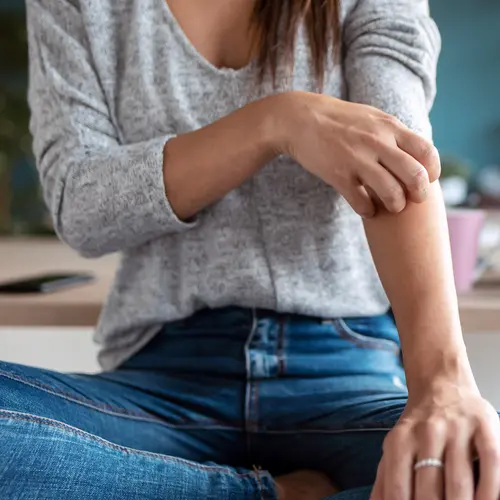You’re a new mom and feel like you’re in an endless loop: Feed the baby, change the baby, get the baby to sleep. Repeat. You’re probably exhausted and stressed. If you have psoriasis, it’s a perfect storm for a flare.
But motherhood doesn’t have to wreak havoc on your skin. Know what to expect and plan ahead to help make life as a new mom a bit more comfortable.
Prepare for a Flare
Many women see their psoriasis symptoms improve during pregnancy. But a short time after delivery, it often roars back to life.
During pregnancy, your overactive immune system -- the cause of psoriasis -- settles down. It happens so your body doesn’t reject your growing baby. But once your baby is born, your immune system snaps back to what it was like before pregnancy. That can trigger a psoriasis flare.
One study found 65% of women said their psoriasis got worse after delivery.
You can hope for the best, but it pays to prepare for a flare. See your dermatologist within a few weeks after you give birth. You and your doctor can make a plan to try to prevent a flare or what to do if one starts.
Breastfeed Comfortably
Psoriasis shouldn’t stop you from breastfeeding if you want to. There are a few ways to do it comfortably and safely:
- Protect your nipples. The area can get dry and cracked and bring on a painful flare. Petroleum jelly or a mild moisturizer can keep your nipples soft. Make sure your bras fit well so they don’t rub against your breasts and irritate them more.
- Prop yourself up. Support your breasts with a rolled-up cloth. A breastfeeding pillow that wraps around your torso may support your baby more comfortably. You can put a soft blanket or towel between the pillow and your skin for even more cushion.
- Be steroid smart. You can apply steroid cream to your breasts if plaques form there. Put it on right after you’re done feeding. But carefully wash your breasts before the next feeding so your baby doesn’t get any of the medicine in its mouth.
You may need stronger treatment with oral and biologic medicines if your psoriasis is severe. Some medicines may be safe for breastfeeding women, so ask your doctor about your choices.
Phototherapy is another safe choice to treat moderate-to-severe psoriasis while breastfeeding. It uses ultraviolet B rays to clear your plaques.
Ask your doctor about the best way to treat psoriasis while you’re breastfeeding.
Pay Attention to Joints
For some people, psoriasis is not just a skin problem. It can make joints sore and swollen, too. Psoriatic arthritis sometimes shows up in women for the first time after pregnancy or another stress-filled life change. Watch for these signs:
- A finger or toe that swells up like a sausage
- Pain, throbbing, swelling, or tenderness in one or more joints
- Stiffness that makes it hard to move in the morning but gets better later in the day
Call your doctor if you notice joint changes. Psoriatic arthritis can damage your body if you don’t treat it.
Find Moments of Zen
Stress not only ups your odds of a flare, but it also makes you more prone to anxiety and depression. Steal a few minutes every day to unwind:
- Take a deep breath. Inhale slowly through your nose and exhale slowly through your mouth. Just a few minutes can slow your heart rate and blood pressure.
- Move. Put your baby in the stroller and head outside for a walk. Aim for 30 minutes a day, 5 days a week. If you’re new to exercise, go for 10 minutes and try to work your way up. If you have arthritis, too, try a joint-friendly exercise like yoga.
- Get help. If stress and anxiety take over your life, you may need to see a mental health counselor. Therapy can give you the tools to manage your emotions better.

